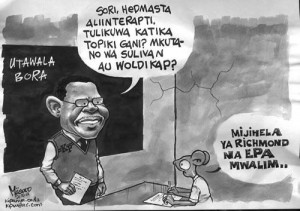The President eventually returned home where his encouragement of people and press to expose corruption was having remarkable effects on the political situation in the country. The ramifications were everywhere. The media and MP’s in the newly emboldened parliament heard new revelations about major corruption on an almost daily basis. The sudden resignation of the Prime Minister and then President Kikwete’s action in dissolving the whole government – see below – shook the nation.
In Britain any suggestion that the free press should be curbed in any way is usually strongly resisted even when it often abuses its position. Tanzania now also has a remarkably free press with more than 30 newspapers. The media has taken the subject of corruption to its heart and is exposing more and more allegations. Although opposition MP’s are taking the lead, even government MP’s are now joining in the chorus demanding punishment of the alleged miscreants.
The Tanzanian equivalent of the British ‘chattering classes’ seem to have reacted in different ways to the abundance of news stories about alleged scandals. Most seem to admire the resolution with which President Kikwete and parliament, in which his ruling Chama cha Mapinduzi (CCM) party has a huge majority, are investigating the alleged cases; others want him to go much further in punishing alleged miscreants; but, some say that, as he had a prominent position in all the recent governments of Tanzania, he should have disassociated himself from corruption at an earlier date.

 “Sorry the headmaster interrupted me – which topic were we on ? The Sullivan Conference [to be held in June 08] or the World Cup ?” “The Richmond and EPA scandals, teacher” Cartoon by Kipanya www.kipanya.co.tz
“Sorry the headmaster interrupted me – which topic were we on ? The Sullivan Conference [to be held in June 08] or the World Cup ?” “The Richmond and EPA scandals, teacher” Cartoon by Kipanya www.kipanya.co.tz